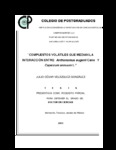Compuestos volátiles que median la interacción entre Anthonomus eugenii Cano y Capsicum annuum L
Abstract
Dado que el picudo del chile es el principal problema fitosanitario en el cultivo de Capsicum spp., y las medidas de control no han logrado mitigar de forma eficiente las poblaciones de este insecto, se estudiaron los siguientes objetivos con el fin de conocer las interacciones planta insecto. Primero se valido un método de recolecta de volátiles, el cual demostró ser eficiente bajo las diferentes variables analíticas estudiadas, con % de recobro de 90-100 y DER menores a 10%. En segundo lugar se evaluó el potencial atrayente de estructuras de la planta como flores, yemas, frutos en desarrollo y frutos comerciales, encontrando que machos prefieren en primer lugar flores y después yemas, y las hembras en su primera opción eligieron yemas y después flores. El tercer objetivo consistió en analizar los extractos volátiles obtenidos de las diferentes estructuras por cromatografía de gases/masas, encontrando cerca de 18 compuestos. Los principales compuestos encontrados e identificados fueron el salicilato de metilo, (E y Z)-β-ocimeno y (3E)-4,8-dimethyl-1,3,7-nonatrieno. En el cuarto objetivo se realizo un scan electrofisiológico con la mayoría de los compuestos identificados. Finalmente se realizo un análisis morfométrico y tipológico del rostrum y sensilla antenales para conocer si existía dimorfismo sexual. _______________ VOLATILE COMPOUNDS THAT MEDIAN INTERACTION BETWEEN Anthonomus eugenii Cano AND Capsicum annuum. ABSTRACT: Since the pepper weevil is the main phytosanitary problem in growing Capsicum spp., and control measures have failed to efficiently mitigate the populations of this insect, we studied the following objectives to meet plant interactions insect. First we validated a method for collection of volatiles, which proved to be efficient under different analytical variables studied, with the recovery of 90-100% and RSD less than 10%. Second evaluated the potential attractant plant structures such as flowers, buds, developing fruits and marketable fruit and found that males prefer flowers firstand then buds and females in their first choice buds and then chose flowers. The third goal was to analyze the volatile extracts of the different structures obtained by gas chromatography / mass, finding about 18 compounds. The main compounds found and identified methyl were salicylate, (E, Z)-β-ocimene and (3E)-4,8-dimethyl-1,3,7-nonatrieno. The fourth objective an electrophysiological scan performed with most of the identified compounds. Finally, morphometric analysis was performed and typological of the rostrum and antennal sensilla to know whether there was sexual dimorphism.
Collections
- Tesis MC, MT, MP y DC [284]


